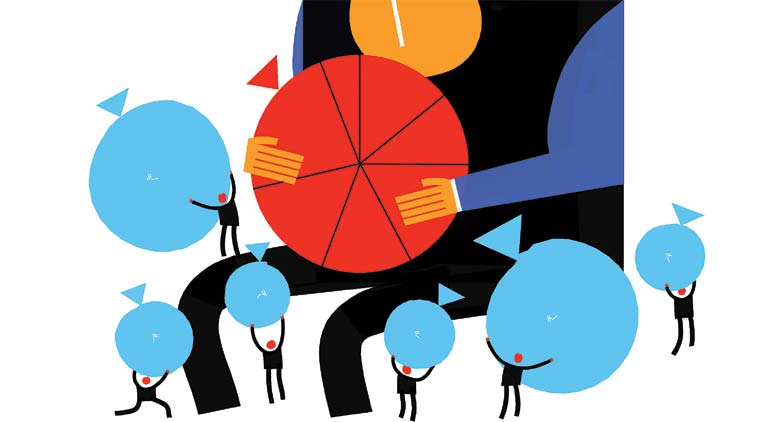Santosh Kumar Mohapatra
Centre—states fiscal relations and related spheres of activities of the two levels of government constitute some of the most litigious issues. In India, Centre-states fiscal relations relate to distribution of power in resource mobilisation between the Centre and states and sharing of expenditure responsibilities. Most important revenue sources are assigned to the Union government, while major expenditure responsibilities in social and economic sectors are assigned to state governments.
Some states are unable to raise adequate resources compared with others. To enable such states to carry out their expenditure responsibilities, a provision exists to transfer resources from the Centre to states as devolution, grants-in-aid and loans based on certain criteria. Normally, the Finance Commission (FC), the finance ministry and NITI Aayog (replacement for Planning Commission) are involved in such resource transfer.
The FC is constituted every five years and its main role is to recommend distribution of ‘divisible pool’ of Central government revenue between the Union and states known as vertical devolution and across states known as horizontal allocation. The FC also recommends principles governing non-plan grants and loans to states.
The 14th FC non-plan grants included disaster relief, revenue deficit grants, and grants to local bodies such as panchayats and municipalities. Under the 13th FC, the distribution of tax revenue among states was determined by a formula with weightage for population (25 per cent), area (10 per cent), fiscal capacity (47.5 per cent) and fiscal discipline (17.5 per cent). In the case of the 14th FC, the distribution of tax revenue and grants was determined through a formula with weightage for income distance (50 per cent), for population of 1971 (17.5 per cent), population of 2011 (7.5 per cent), area (10 per cent), and forest cover (7.5 per cent).
The 15th FC was constituted November 2017 under chairmanship of NK Singh, a former Revenue secretary and Rajya Sabha MP. It will recommend central transfers to states and has also been mandated to review impact of the 14th FC recommendations on the fiscal position of the Centre; review debt level of the Centre and states, and recommend a roadmap; study the impact of GST on the economy; and to recommend performance-based incentives for states based on their efforts to control population, promote ease of doing business, and control populist expenditure.
A contentious decision of the 15th FC is that it will use Census-2011 data instead of Census-1971 data to determine devolution of taxes, duties and grants. The 14th FC took Census-1971 as the base with weightage of 17.5 per cent and assigned weightage of 10 per cent to the 2011 population figures, leading to roughly equal treatment for states. Using Census-2011 data will lead to losses for states that have delivered well in terms of population control and, further, it will lead to a north-south divide. Odisha and some southern states, which have done well in controlling populations, will get a smaller share of the pie. Hence, population figures of 1971 should be used instead of Census-2011 figures. These states should be rewarded for having controlled population growth.
Although the Centre claims it has increased the share of states in divisible pools from 32 per cent to 42 per cent, the reality is different. Overall, from 2015-16 to 2017-18 — the period under the 14th FC — against the recommended 42 per cent, the effective tax transfer was only 34.9 per cent. The main reason was that although revenues collected through cess and surcharges increased by leaps and bounds and flowed directly to the Centre, it was not shared with states. Revenue from surcharges and cesses is expected to touch a staggering Rs 3.02 lakh crore in 2018-19.
Further, the government reduced Centre-sponsored schemes and changed the sharing pattern to the detriment of states. As a result, the overall transfer from centre to states has not increased. Overall, the share of states was 56.2 per cent in 2015-16, much less than 2011-12 when it was 61 per cent. Further, the government’s decision to stop central assistance for eight schemes will result in loss of another Rs 1,854.05 crore for Odisha.
Hence, the Centre should restore central assistance for the 8 schemes and increase its share in other schemes. The commission should take effective measures to rectify vertical imbalances by way of bringing cess and surcharges, to the divisible pool of resources.
The 14th FC abolished weightage given to fiscal discipline and introduced revenue deficit grants, which became a reward for states for their fiscal profligacy. Odisha was deprived of funds as it maintained revenue surplus. The 15th FC has been asked to exercise the option to do away with post-devolution revenue deficit grants to states. This is a welcome step. But backwardness, poverty ratio, percentage of SC/ST population, especially human development index, should be criteria for allocation of such grants or relief to states.
Whoever comes to power in Delhi claims Odisha is getting huge money from the Centre. But the percentage share of Odisha from net proceeds of the central taxes and duties has declined from 5.16 per cent (12th FC) to 4.77 percent (13th FC) and further to 4.64 per cent in the 14th FC. This may be addressed by the 15th FC. The decline in the share of Odisha in total divisible pool should be reversed and should be restored in tune with 12th FC.
The 14th FC desisted from specific purpose grants and discretionary grants and left them to the Union government. The Centre linked them to electoral benefits and declared schemes for states set to participate in the electoral process. It may be recalled that some previous FCs had given grants for activities such as construction of medical colleges, lakes and temples rejuvenation, and airports. Hence, the 15th FC should declare discretionary grants to enhance progress of states such as Odisha, which are plagued by backwardness, natural calamities, and Maoist insurgency.
The writer is an Odisha-based economist. e-Mail: skmohapatra67@gmail.com.
